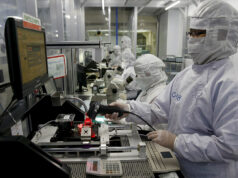Shell stations start collecting higher fuel taxes — Energy dep’t
PILIPINAS Shell Petroleum Corp. has adjusted the prices of the petroleum products it is selling to reflect the implementation of the higher excise and value-added taxes under the Tax Reform for Acceleration and Inclusion, or TRAIN law.
In a press conference on Thursday, the Department of Energy (DoE) said its Oil Industry Management Bureau (OIMB) had received up to 444 reports from retail stations that have imposed the second tranche of the tax reform.
“There are 369 outlets from Petron Corp., 46 from Pilipinas Shell Petroleum Corp. and 29 from Flying V,” said Energy Undersecretary William Felix B. Fuentebella.
He said the bureau had sent two teams on Thursday to visit various retail outlets in Caloocan, Quezon City and Malabon to serve show-cause orders and to validate their documents on the imposition of excise tax and its corresponding additional value-added tax.
“We are ensuring that our consumers do not become subjects of profiteering. We are issuing show-cause orders to the concerned retail outlets for them to explain their implementation of the second tranche of excise taxes. In addition, we are also validating the prices of their fuel products to check whether they have already imposed the second wave of excise taxes,” Energy Secretary Alfonso G. Cusi was quoted as saying.
Under the second tranche of TRAIN, an additional excise tax of P2 will be imposed per liter of diesel and gasoline, and P1 per kilogram on household liquefied petroleum gas (LPG).
An additional 12% value-added tax will also be imposed, which totals to P2.24 for both diesel and gasoline, and P1.12 for LPG. The imposition of the taxes took effect on Jan. 1, 2019.
Rino E. Abad, director of OIMB, said the imposition of excise tax by retail outlets depends on the exhaustion of their existing 2018 inventories.
Only new inventories in 2019, directly imported or locally produced by refineries, are covered by the second tranche of excise tax, the DoE noted.
Mr. Rino said retail stations’ inventory levels vary, depending on the status of individual depots and retail outlets, and turnover for specific products such as diesel, gasoline, kerosene, and liquefied petroleum gas. — Victor V. Saulon



